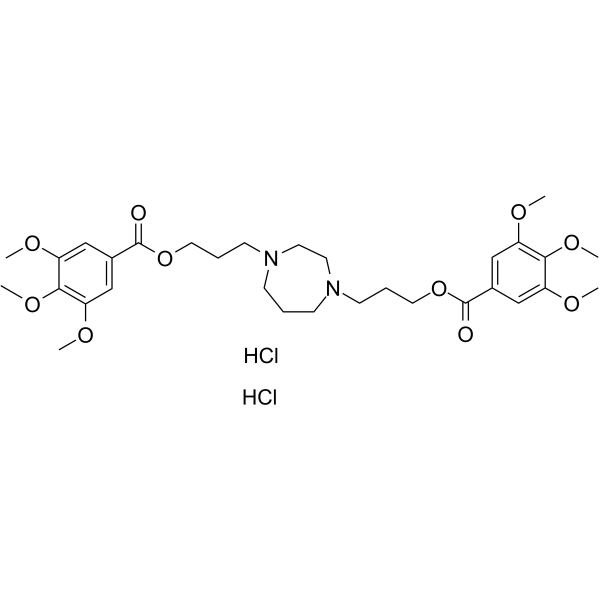
Dilazep dihydrochloride
CAS No. 20153-98-4
Dilazep dihydrochloride( —— )
Catalog No. M26668 CAS No. 20153-98-4
Dilazep dihydrochloride is an adenosine uptake inhibitor. Dilazep dihydrochloride also inhibits the ischemic damage, membrane transport of nucleosides and platelet aggregation.
Purity : >98% (HPLC)
 COA
COA
 Datasheet
Datasheet
 HNMR
HNMR
 HPLC
HPLC
 MSDS
MSDS
 Handing Instructions
Handing Instructions
| Size | Price / USD | Stock | Quantity |
| 5MG | 35 | Get Quote |


|
| 10MG | 58 | Get Quote |


|
| 25MG | 115 | Get Quote |


|
| 50MG | 192 | Get Quote |


|
| 100MG | 312 | Get Quote |


|
| 200MG | 448 | Get Quote |


|
| 500MG | Get Quote | Get Quote |


|
| 1G | Get Quote | Get Quote |


|
Biological Information
-
Product NameDilazep dihydrochloride
-
NoteResearch use only, not for human use.
-
Brief DescriptionDilazep dihydrochloride is an adenosine uptake inhibitor. Dilazep dihydrochloride also inhibits the ischemic damage, membrane transport of nucleosides and platelet aggregation.
-
DescriptionDilazep dihydrochloride is an adenosine uptake inhibitor. Dilazep dihydrochloride also inhibits the ischemic damage, membrane transport of nucleosides and platelet aggregation. Dilazep dihydrochloride has cerebral and coronary vasodilating action through enhancement of effect of adenosine.(In Vitro):Dilazep, NBI and Dipyridamole have been reported to inhibit the uptake of adenosine into different cells. The uptake mechanism has been studied extensively in vitro. In these compounds, Dilazep and NBI are almost 10 times more effective than Dipyridamole. Only Dilazep is water soluble and no solubility aiding organic solvent is needed for preparing an aqueous solution.(In Vivo):Dilazep inhibits the phospholipase activation in reperfused heart mitochondria and also inhibits the lipid peroxidation caused by cerebral ischemia and reperfusion. Dilazep may prevent ischemic cerebral injury due to an increase in cerebral blood flow and/or its protective effects on vascular endothelial cell membrane. After administration of Dilazep, even low doses (0.04-0.1 mg/kg/min) of exogenous adenosine significantly increases superior mesenteric arterial conductance (SMAC) and elevates arterial plasma adenosine concentration. The increased adenosine levels were highly correlated with the increased percentage of change of SMAC and values for Rmax and EC50 were 193.4% change of SMAC and 2.8 μM, respectively. Administration of bolus doses of 8-phenyltheophylline abolishes the ability of Dilazep to potentiate vasodilation. However, it did not affect isoproterenol-induced relaxation.
-
In VitroThe uptake mechanism has been studied extensively in vitro and Dilazep, NBI and Dipyridamole have been reported to inhibit the uptake of adenosine into different cells. Of these compounds, Dilazep and NBI are almost 10 times more potent than Dipyridamole. In addition, only Dilazep is water soluble and no solubility aiding organic solvent is needed for preparing an aqueous solution.
-
In VivoAfter administration of Dilazep, even low doses (0.04-0.1 mg/kg/min) of exogenous adenosine significantly increases superior mesenteric arterial conductance (SMAC) and elevates arterial plasma adenosine concentration. The increased adenosine levels were highly correlated with the increased percentage of change of SMAC and values for Rmax and EC50 were 193.4% change of SMAC and 2.8 μM, respectively. Administration of bolus doses of 8-phenyltheophylline abolishes the ability of Dilazep to potentiate vasodilation, but did not affect isoproterenol-induced relaxation.Dilazep inhibits the phospholipase activation in reperfused heart mitochondria and also inhibits the lipid peroxidation caused by cerebral ischemia and reperfusion. Dilazep may prevent ischemic cerebral injury due to an increase in cerebral blood flow and/or its protective effects on vascular endothelial cell membrane.
-
Synonyms——
-
PathwayOthers
-
TargetOther Targets
-
RecptorCOX-2
-
Research Area——
-
Indication——
Chemical Information
-
CAS Number20153-98-4
-
Formula Weight677.61
-
Molecular FormulaC31H46Cl2N2O10
-
Purity>98% (HPLC)
-
SolubilityIn Vitro:?H2O : ≥ 100 mg/mL (147.58 mM))
-
SMILESCl.Cl.COc1cc(cc(OC)c1OC)C(=O)OCCCN1CCCN(CCCOC(=O)c2cc(OC)c(OC)c(OC)c2)CC1
-
Chemical Name——
Shipping & Storage Information
-
Storage(-20℃)
-
ShippingWith Ice Pack
-
Stability≥ 2 years
Reference
1.Cho, Eui Hwan, et al.Pharmaceutical composition comprising rebamipide precursor for oral administration for preventing or treating immune disease and metabolic disease.WO2017138717A1.
molnova catalog



related products
-
SJ000291942
SJ000291942 is an activator of the canonical bone morphogenetic proteins (BMP) signaling pathway.
-
Boc-11-aminoundecano...
Boc-11-aminoundecanoic acid is an Alkyl/ether-based?PROTAC linker?can be used in the synthesis of MS432.
-
Odontoside
The herbs of Gastrodia elata BL.



 Cart
Cart
 sales@molnova.com
sales@molnova.com


